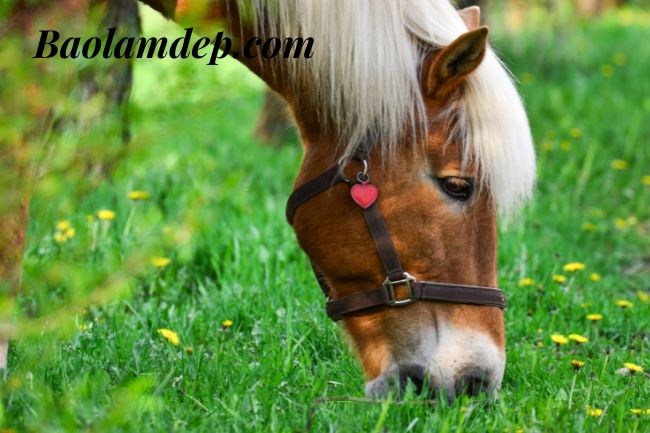Can horses eat celery? Have you ever wondered about this? Celery is a nutritious vegetable, but can horses consume it? In this article, we will explore whether horses can eat celery and the benefits and limitations of including it in their diet. Discover more about feeding horses celery and how to safely and beneficially incorporate this vegetable into their feeding routine.

1.Horses’ diet:
The diet of horses plays a crucial role in their overall health and well-being. As herbivores, horses are naturally adapted to consume primarily forage and plant-based foods. The main component of their diet is grass, which provides them with essential nutrients, fiber, and energy. Fresh, high-quality grass is ideal for horses, and they can graze on it throughout the day.
In addition to grass, horses can also consume hay, which is dried grass or legume plants. Hay serves as a substitute for fresh grass when it’s not readily available, especially during the winter months or in areas with limited pasture.
Apart from forage, horses can also be fed grain mixtures, such as oats and barley, to supplement their diet with additional energy and nutrients. However, it’s important to note that the quantity of grains should be carefully controlled to prevent weight gain and other health issues.
Incorporating a variety of fruits and vegetables can also be beneficial for horses, as they provide additional vitamins and minerals. However, it’s crucial to introduce new foods gradually and monitor the horse’s response to ensure they tolerate them well.
Overall, a well-balanced diet for horses consists of a combination of fresh grass or hay, controlled amounts of grains, and occasional fruits and vegetables. It’s essential to consult with a veterinarian or equine nutritionist to develop a tailored diet plan based on the horse’s specific needs, age, activity level, and overall health condition.
2. Can horses eat celery?
Celery is a nutritious vegetable that is commonly consumed by humans, but can horses eat celery? While horses are primarily herbivores and their diet consists mainly of grass and hay, they can eat celery in moderation. Celery is low in calories and contains essential vitamins and minerals such as vitamin K, vitamin C, and potassium.
Feeding celery to horses can provide them with a variety in their diet and some additional nutrients. However, it is important to take certain precautions when introducing celery into a horse’s diet.
Firstly, celery should be offered as a treat or a supplement to their regular diet, rather than being a major component. It should not replace their primary sources of forage and fiber.
Secondly, celery should be chopped into small, manageable pieces to prevent choking hazards. Horses have a unique digestive system designed for processing fibrous foods, so larger pieces of celery may be difficult for them to chew and digest properly.
Lastly, it is crucial to monitor the horse’s response to celery. Some horses may have individual sensitivities or allergies to certain foods, so observing any signs of digestive discomfort or adverse reactions is important. If any issues arise, it is best to discontinue feeding celery and consult a veterinarian for guidance.
In conclusion, while horses can eat celery, it should be given in moderation and as a supplementary treat rather than a staple food. As always, it is recommended to consult with a veterinarian or equine nutritionist to ensure that the horse’s diet is balanced and suitable for their individual needs.
3. Benefits and harms of feeding horses celery
So the answer for the question “can horses eat celery” is yes. Why should we feed our horses celery? Here are some benefits and harms you need to be aware of:
3.1. Benefits of feeding horses celery:
- Nutritional value: Celery is rich in vitamins and minerals, including vitamin K, vitamin C, potassium, and folate. These nutrients can contribute to the overall health and well-being of horses.
- Hydration: Celery has a high water content, which can help keep horses hydrated, especially during hot weather or intense physical activity.
- Digestive health: The fiber content in celery can promote healthy digestion and regulate bowel movements in horses.
- Chewing exercise: Celery requires horses to chew, which can provide them with mental stimulation and promote dental health by naturally wearing down their teeth.
3.2. Harms of feeding horses celery:
- Choking hazard: Celery, especially the fibrous parts, can pose a choking risk if not chopped into small, manageable pieces. Horses have sensitive throats, and large, stringy pieces of celery can get lodged and cause blockages.
- Allergic reactions: Some horses may be allergic or sensitive to celery, experiencing symptoms such as skin rashes, itching, or digestive disturbances. It’s important to monitor the horse’s response when introducing celery into their diet.
- Quantity control: While celery can provide nutritional benefits, it should be given in moderation. Feeding excessive amounts of celery can upset the horse’s digestive system, leading to loose stools or other digestive issues.
- Nutritional balance: Celery should not replace the horse’s primary forage and balanced diet. It should be considered as a supplemental treat or addition to their regular feed rather than a significant component.
Overall, feeding horses celery can offer certain nutritional advantages and contribute to their overall health. However, it’s crucial to chop it into appropriate sizes, monitor the horse’s response, and ensure it is provided in moderation as part of a balanced diet. Consultation with a veterinarian or equine nutritionist can provide specific guidance based on the horse’s individual needs and dietary requirements.

4. Some additional feeding tips for horses:
- Make gradual dietary changes: When making changes to a horse’s diet, do so gradually and gently. This helps the horse’s digestive system adapt and prevents digestive disturbances.
- Check food quality: Ensure the food provided to the horse is of good quality. Use clean, fresh feed that is not spoiled. If possible, choose organic food and avoid harmful additives.
- Provide clean water: Ensure the horse always has access to clean and fresh water. Change the water regularly and check water sources for quality and safety.
- Monitor weight: Regularly check the horse’s weight to ensure it is not increasing or decreasing excessively. If there are significant changes, consult a veterinarian.
- Learn about feeding-related diseases: Gain knowledge about feeding-related diseases such as colic or equine diabetes. This helps in early detection of abnormal signs and implementing appropriate prevention or treatment measures.
- Avoid overfeeding: Control the amount of food provided to the horse. Do not allow the horse to overeat or under-eat. Ensure it receives an adequate and balanced diet according to its nutritional needs.
- Regular health check-ups: Schedule regular veterinary check-ups to monitor the horse’s overall health and detect any feeding-related issues.
- Tailor to individual needs: Remember that each horse has unique nutritional requirements and health conditions. Tailor the feeding program accordingly, considering factors such as weight, age, activity level, and specific health needs.
- Seek professional advice: If you have any concerns or questions about your horse’s diet, seek guidance from equine nutritionists or veterinarians who specialize in horse health and nutrition.
We hope that the above article from Báo Làm Đẹp provides you with valuable information about “can horses eat celery“.
In conclusion, horses can safely consume celery as part of their diet. It offers hydration, fiber, and essential nutrients. However, it’s important to feed celery in moderation to prevent potential digestive problems. Seeking advice from a veterinarian and introducing celery gradually will help maintain a balanced and healthy feeding regimen for horses.
